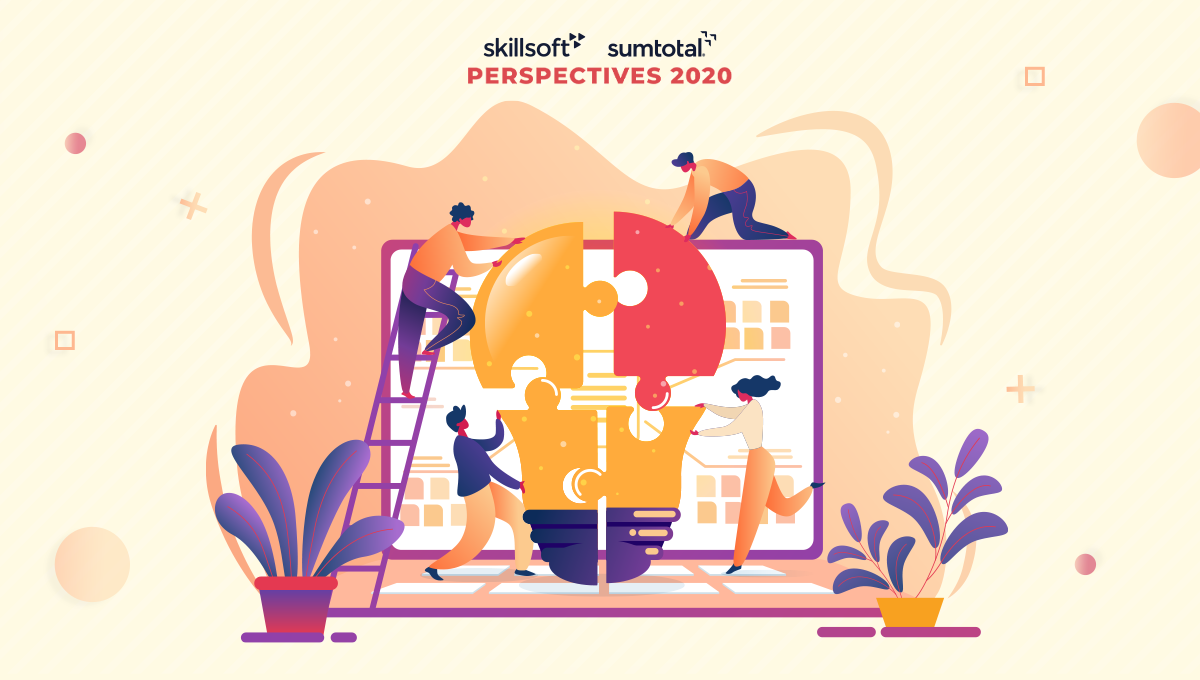
Last week, we learned, shared, & expanded both our knowledge and network from the comfort of our own home offices. SumTotal and Skillsoft "Perspectives 2020" provided us a timely platform to engage, debate, and review our HR and learning initiatives with the change in the current business landscape. With informative keynotes and interactive sessions, the 24-hour digital experience ran across four continents, offering valuable insights to all its attendees.
As we drift slowly towards our next normal, it's essential to recollect and share the wisdom we have gained along the way. Here are a few vital insights our team had captured from great line-up of sessions we have attended.
Perfection isn't a pressing priority
In times of crisis, perfection is an indulgence. L&D professionals thrive on perfectionism in a traditional landscape. We know it's a hard pill, but people today care about timely outputs rather than perfect outcomes. Here's what Mike Kessler said while discussing about talent optimization development programs in financially uncertain times:
The cost of waiting for a week or just a day to get it perfect; isn't worth it when the businesses need it now.
—Mike Kessler, Chief Learning Officer of BAE Systems
The Four D Rule
In an interesting debate on who should own the skilling agenda of the future workforce, Arvind Gupta revealed the four types of jobs that will be disrupted by digital automation in the future. They are:
- Duplicate: The kind of situations where repetitive and routine tasks are prevalent, will soon be replaced with digital technology.
- Delicate: Anything that is too delicate for humans to handle. Arvind pointed out that very soon, robotics will take over surgeries and testing.
- Dangerous: Any job where a particular risk is involved. In times such as these, even sanitizing a hospital is a dangerous job.
- Dirty: Any job that involves dealing with dirt, like manual scavenging.
Skills of the Future
Ever since its outbreak, COVID-19 has been reshaping the business world. It has accelerated our modus operandi and proved that things could be done overnight. To keep up with the pace of transformation, we must continuously keep building new capabilities. In a head-to-head debate moderated by Manojit Sen, Hamidah Naziadin named digital, data, and design skills as the key skills of the future but put learning ahead of all the three.
The most important skill one should have for the future is the openness to learn.
— Hamidah Naziadin, Group Chief People Officer, CIMB
The Capability Academy
The most prominent issue organizations are facing while responding to the pandemic is "Human." To help employees perform in such erratic circumstances, industry analyst Josh Bersin proposes the idea of building capability academies. He recommends that the L&D, in partnership with the business leaders, should:
- Identify and create a family of capabilities required for specific roles.
- Create learning pathways and journeys for employees to attain these capabilities.
- Let the businesses assess these capabilities, not L&D.
- Stick the content in an LXP to enable self-directed learning.
Encourage Your People to Take Breaks
We know that as managers, we need to keep our people motivated as they work from their homes. However, we also need to realize that in WFH, there's no natural end time for work, and every day feels like a Monday. While discussing the surprising difficulties of work from home culture, Lisa Rowan opined that this could be a moral challenge for employees. And to resolve the problem, leaders should encourage them to take breaks and make sure they are not checking their emails at mid-nights, Saturdays, and Sundays.
Develop Personal Skills
In a business continuity discussion, Marienne Bernardes, Director, Enterprise Learning & Development, Cox Enterprises invites the audiences to think about who they want to become at the end of this pandemic. She added that-
This is not going to be a sprint; this is going to be a marathon. And this marathon is going to change the world.
—Marienne Bernardes, Cox Enterprises
So, it's crucial to develop not only professional skills but also personal skills. Although, most of our speakers seem infatuated with learning Spanish, they also recommend practicing yoga, meditation, and more. Developing personal skills means investing time in yourself to improve your mental health and unlock your inner potential.
In a session, Anuranjita Kumar stated, "Now is not the time to make decisions alone." In correlation with the above statement, Shawn Achor, in his keynote, elaborated on the science behind the notion. When we address a challenge as a team, our brain reduces the height of the problem by 20% as opposed to what we perceive in isolation.
Your people's productivity is directly proportional to their social cohesion within a team.Good social connectivity influences happiness, inducing positivity.This positivity helps individuals stretch themselves in times of crisis and improves their productivity.
Conclusion
SumTotal & Skillsoft's Perspectives' 2020 has delivered on its promises. It brought business leaders, L&D professionals, and thought leaders together to fight the crisis. Though their perspectives differ from one another, all our speakers agree that the below attributes are essential for organizations to live through the crisis.
- Resilience: The ability to stretch and spring back up once the pandemic is gone.
- Empathy: The virtue by which a leader should see things from his people's perspective.
- Learning: The essential solution for organizations to adapt to the current needs.
These are our top picks from the event. Are you eager to learn more and experience it yourself?
Phenom eCloud is a comprehensive technology solutions provider committed to empowering businesses to overcome challenges, enhance their workforce capabilities, and achieve superior outcome





Leave a Comment